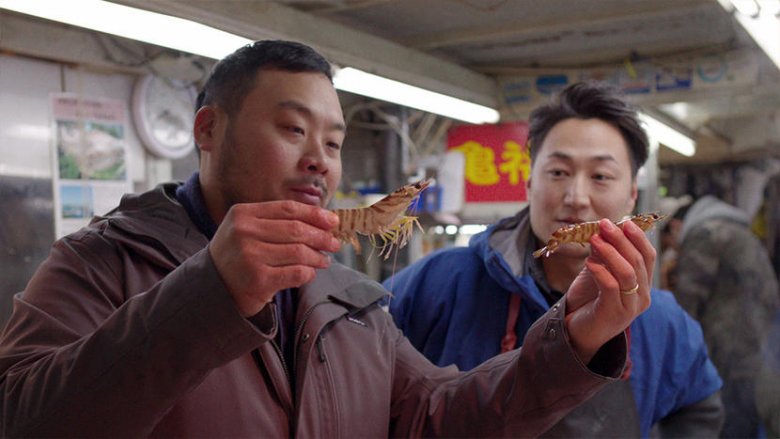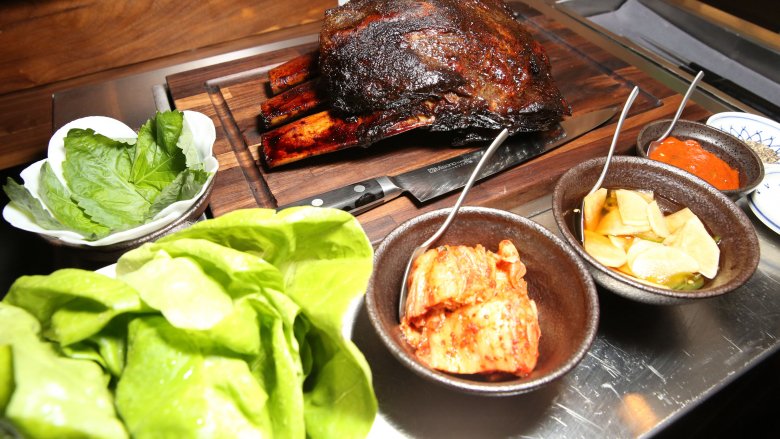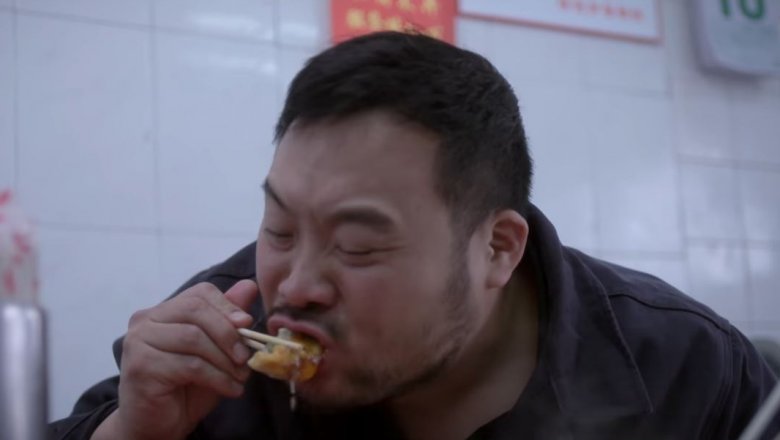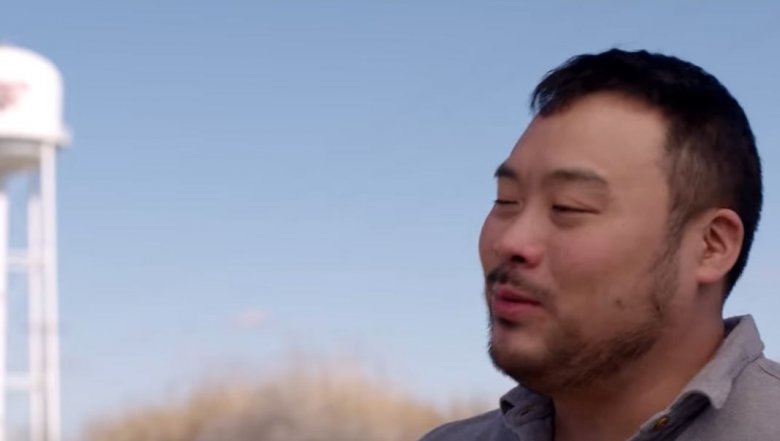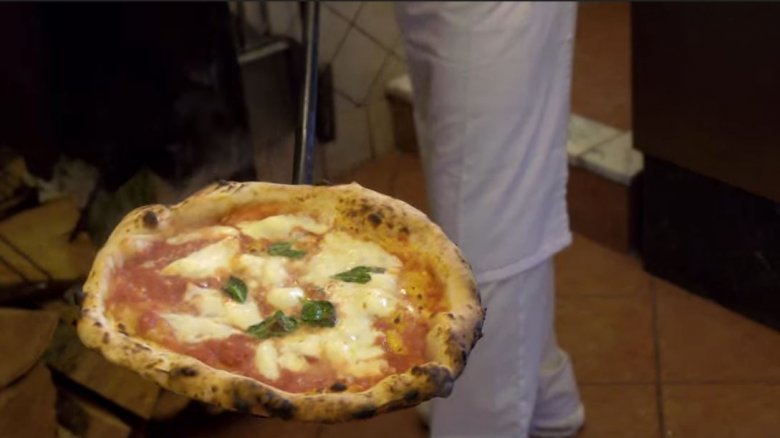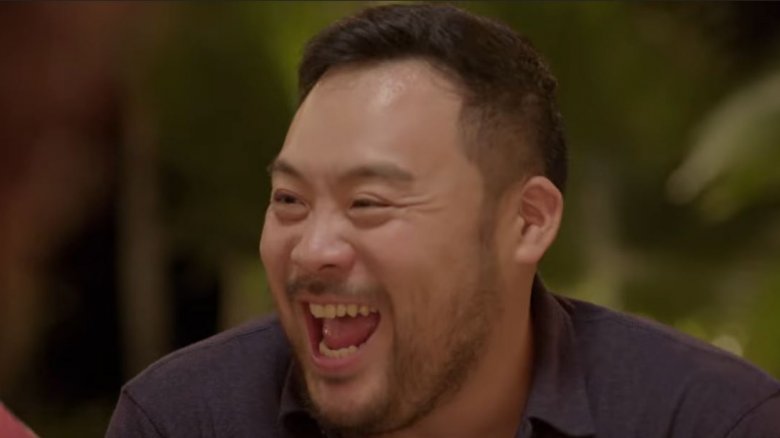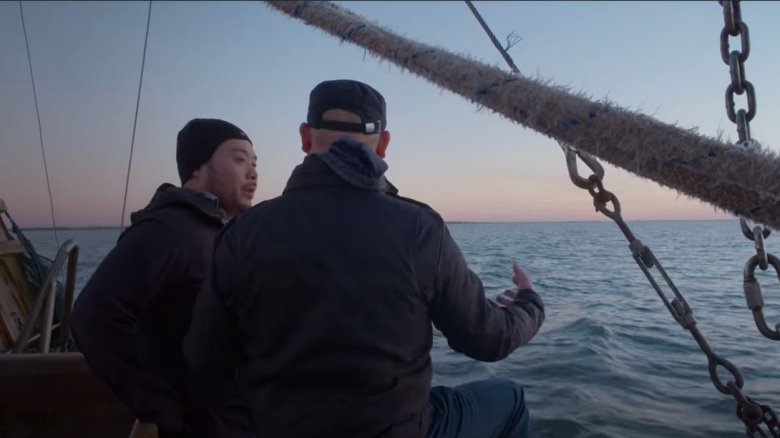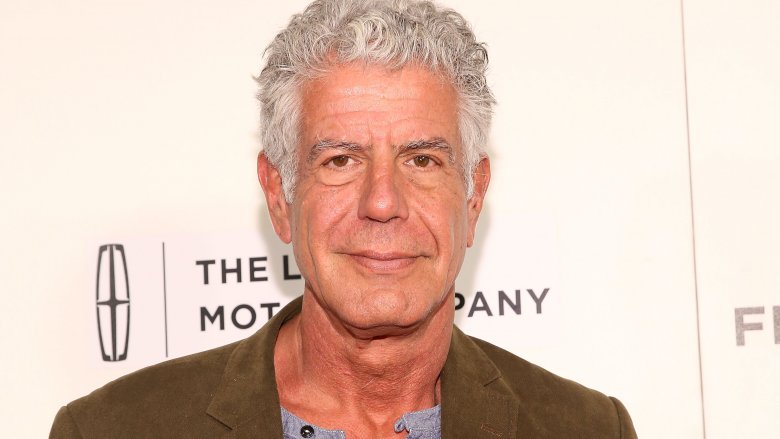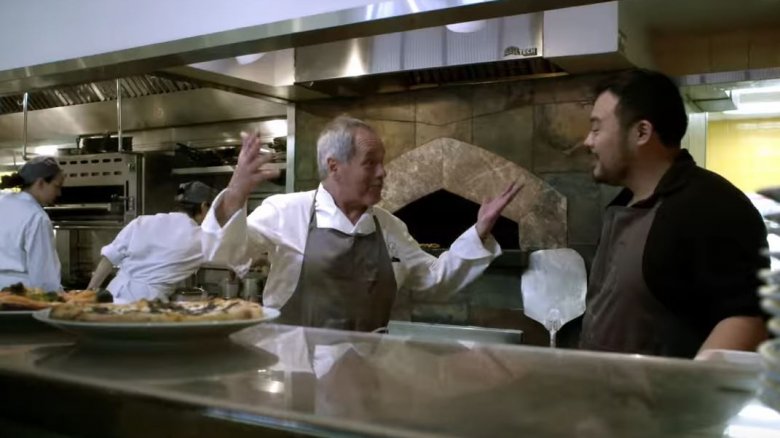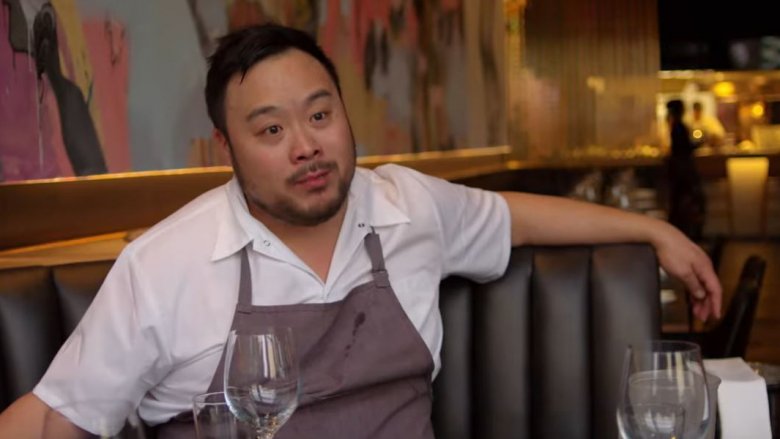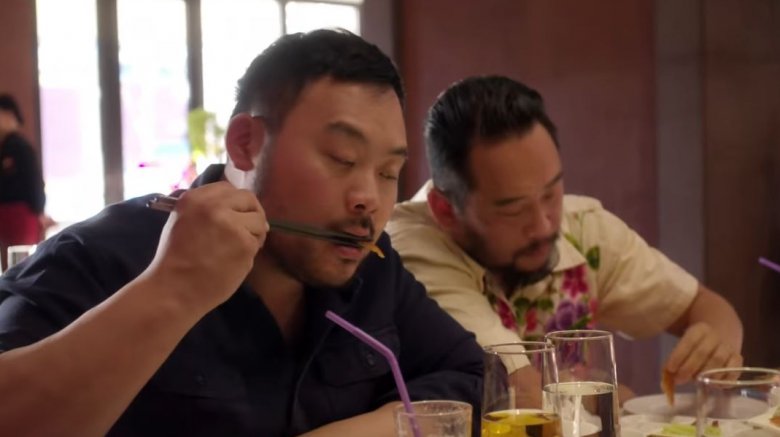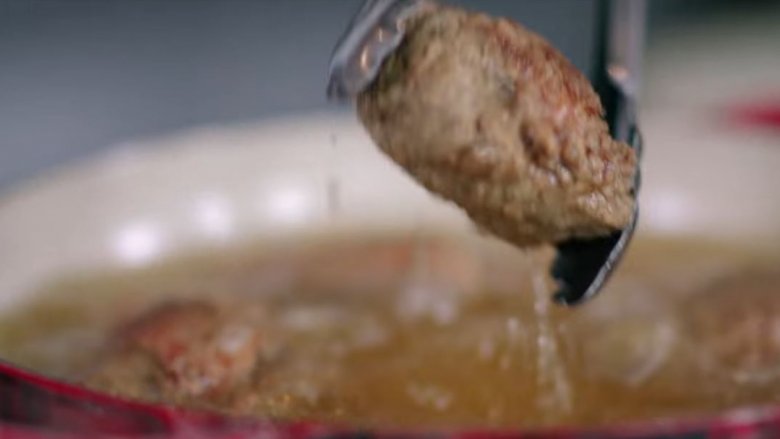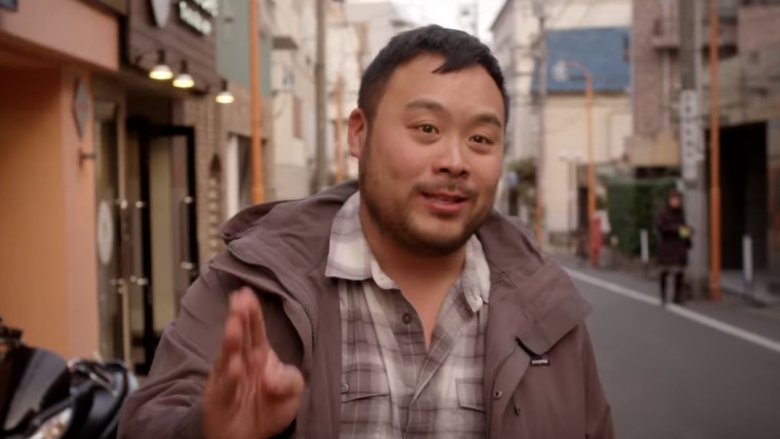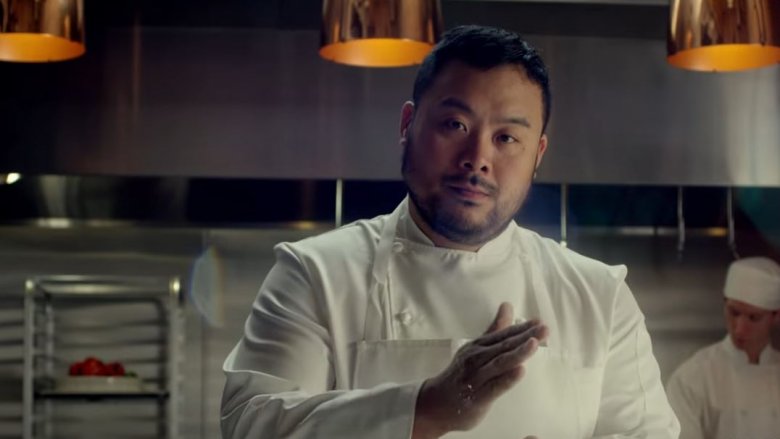The Untold Truth Of Ugly Delicious
Netflix is changing the future of television, and culinary TV is no exception. The subscription streaming service has been churning out must-watch original shows for a few years now, and is starting to lure dedicated cable viewers away from Food Network with culinary hits like Nailed It! and The Curious Creations of Christine McConnell. In 2018, Netflix came out with original series Ugly Delicious, reminding us once again that the network is more than capable of creating quality cooking shows.
Part cooking show and part travel show, Ugly Delicious tours the world in search of extraordinary culinary experiences with chef David Chang, head of the Momofoku restaurant group, at the helm. Chang challenges his viewers to abandon their preconceived notions about food and introduces them to new culinary delights, exploring culture and history along the way. Whether you binge watched the show as soon as it was released or have yet to partake in the gift that is Ugly Delicious, you'll be fascinated with the untold truth of the show that will spark both your wanderlust and your hunger.
What does Ugly Delicious mean?
The words "ugly" and "delicious" might not seem like they go hand-in-hand, but they hold a special significance for show host David Chang. The phrase originally hit the food scene through Chang's Instagram account as a hashtag he used for food that wasn't necessarily picture perfect and Instagram worthy, but that tasted really, really good. Chang believes that some of the world's tastiest dishes are underappreciated because of this lack aesthetic appeal, but that they deserve to have their stories told.
Chang told AOL that the idea for the show predated the hashtag, though. "It was the whole idea of me finding the food that I'm comfortable making, because the food that I was eating and still loving I was ashamed to actually embrace," he said. "Tie that in with now, when food is more popular than ever before — particularly with social media. Some of the most delicious things — the things that I grew up eating — I'm now more comfortable embracing, and so much of the most delicious stuff falls under 'beauty being in the eye of the beholder.'"
The phrase eventually came to be the name of the show, and Chang believes that "it really does encapsulate what the show is trying to be."
"There's no universal truth about any food"
Ugly Delicious shows the commonalities of different cultures through food, proving that people around the world have more in common than they likely anticipate. No matter where you are on the map, "we're all making sort of the same thing," Chang told NPR. Chang aims to unearth the stories about those dishes and challenge how people think of food. He explained that it is "cultural beliefs and cultural biases" that influence the differences one dish can have from region to region.
"There's no universal truth about any food," he said. "Because we have so many beliefs and we have so many cultural truths, you're gonna have that variation in food, not just with ingredients. I mean, fried chicken is probably cooked [all around] the world, but it's a specific story for each person."
Executive producer Morgan Neville told Deadline that food is a great unifier across humanity, calling it "the most fundamental element" of cultural identity. "There's a basic kind of beauty and almost kind of primal attraction to looking at food," he said. "There's nobody in all the planet that doesn't have a relationship to food... it just has an incredibly innate power for everybody."
It "was never, never, never supposed to happen"
Ugly Delicious has seen critical success and became a hit with audiences, but Chang, who previously hosted an Anthony Bourdain-produced show, The Mind of a Chef, on PBS in 2012, never aspired to be a TV chef. Even hosting The Mind of a Chef wasn't something he planned. "Mind of a Chef was never supposed to be a TV show, it got re-purposed," Chang told The Daily Beast. "I never would have signed up for that if it was like, 'Hey, let's do a TV show.' I stopped doing TV almost across the board, because I didn't want to do it."
Chang told Entertainment Weekly that Ugly Delicious was "never, never, never supposed to happen." Chang added that he doesn't even watch much TV (aside from Bourdain's shows), and doesn't consider himself an entertainer. "I think first [and] foremost I work in the restaurant business," he said. "Everything else is sort of secondary, incidental."
It was Oscar-winning director Morgan Neville (who ended up executive producing the show) who changed Chang's mind about returning to TV by pitching the show that would become Ugly Delicious as "a punk rock TV show, a show about breaking down all expectations and borders."
Chang breaks down "classist" food ideals on the show
On Ugly Delicious, Chang dismantles the idea that food must be fancy in order to be good, attacking food purists as having ideals rooted in classism. In an interview with The Daily Beast, Chang used pizza as an example, describing how many look down on fast food chains as inferior. "Some people make fun of me because I'll order Domino's [pizza] occasionally," he said. "And it's always struck me as classism or elitism. If I grew up eating Lucali's pizza, I probably never would have had Domino's."
Chang challenged the sentiment that people who enjoy Domino's have unrefined palates, saying that if they like the pizza, "they're not wrong." Judging other people's taste in food also carries with it a certain danger, he warned. "If you pass judgement on someone, which we're all prone to do, you might not get that person to appreciate any other kind of pizza," he said. "We don't want anyone to feel like they're being shamed."
Cultural appropriation is also challenged
For Chang, good food is good food no matter where it comes from. It doesn't have to be "authentic" to pass his litmus test. On Ugly Delicious, he challenges cultural appropriation, the idea that it is inherently wrong for someone outside of a particular ethnic group to prepare that culture's food. For Chang, who is Korean-American, filming the show helped him appreciate how chefs borrow from other cultures.
"For example, one of the things I was critical of myself... was people making kimchi," he told Fast Company. He explained that he wants people who make kimchi to understand the cultural significance behind the Korean staple. That doesn't mean, however, that he doesn't think people who aren't well-versed in kimchi's history shouldn't make it. Rather than "chastising or internally criticizing someone because they just learned how to make kimchi and they put it on a menu," Chang said "maybe the best thing I can do is let them continue to do it because if they do a good job of it and they like it, maybe they're going to become an expert in it. And then through that, they're going to understand Korean culture or Asian-American culture or cultures outside of their norm."
At the end of the day, America is a blend of cultures. "What makes America great is that we culturally appropriate better than anyone else," said Chang.
It's not afraid to dig into political issues
Ugly Delicious doesn't shy away from hot button issues, and that includes politics. In its debut season, for example, Ugly Delicious explored the effects of the Trump administration and how his strict immigration policies affect the culinary world. The show highlighted chefs like Christina Martinez, an undocumented immigrant who is also the co-owner of Philadelphia's El Compadre and South Philly Barbacoa. "And we're barely scratching the surface, but our profession is made up of immigrant workers," Chang told Fast Company.
While sometimes political, Ugly Delicious doesn't pass judgement on sensitive topics. The important thing is to get people talking. "And if anything, I think what we try to convey is that it's not a black and white issue," said Chang. "You can't say this is good and that's bad. It's more nuanced. I don't think we want anyone to say that this is the definitive answer on anything that we're talking about. It's simply to raise awareness and to have a conversation, and to arm yourself with more knowledge, and that's it."
Without Anthony Bourdain, the show wouldn't have been possible
If Ugly Delicious reminds you of Anthony Bourdain and his adventurous cooking shows such as No Reservations and Parts Unknown, there's a reason for that. Executive producer Morgan Neville, who also directed a couple episodes of Ugly Delicious, credits the late chef with creating a demand for globetrotting shows that sample local cuisine."I was always a huge fan [of Bourdain's]," Neville told Deadline. "He was the godfather of this new idea of looking at food. His shows completely opened up this world and Ugly Delicious would not have existed if Tony hadn't done everything he did," he said.
Many people involved in Ugly Delicious, including Chang and his sometimes co-host Pete Meehan, were close to Bourdain and called him Uncle Tony. "I think everybody always felt like they owed a lot of what they did, a lot of how they looked at food because of what he had done," said Neville.
Appearances by famous comedians give the show a lighthearted vibe
With so many conversations about controversial issues, it would be easy for Ugly Delicious to alienate viewers looking for a lighthearted cooking show rather than serious sociopolitical commentary, but Ugly Delicious strikes a fine balance between serious and upbeat. The show regularly pulls in guests, including famous comedians, who lighten the mood on set. Comedian guest stars include big names like Aziz Ansari, Jimmy Kimmel, and Ali Wong.
Chang's decision to bring them on the show wasn't just for the obvious entertainment value, though. The chef truly values the culinary experiences of people from all walks of life. "It's been a crazy run, and what I've learned over the years is that everyone — comedians, athletes — wants to eat well and know where to go," he told AOL. "Through Momofuku, I've been able to know a lot of these people. ...The important part to that was that I'm not the food expert on everything, but someone else might know more than I do, and they don't have to be a chef."
The show transformed Chang into an Asian American icon
Before the show premiered, Chang was a respected and well-known restaurateur. Ugly Delicious not only transformed him into a recognizable television personality, but also an Asian-American icon. His success was made more significant by the fact that Asian-Americans are underrepresented in television. This is one of the factors that convinced Chang, the son of Korean immigrants, to go forward with the show, in spite of his initial reluctance. "There are not a lot of Asians on TV," he told The Daily Beast. "And I think that is a responsibility that I'm learning." Chang added that, while he is proud of his roots, he was embarrassed of his heritage as a kid and didn't embrace his identity until he was older.
His status as a representation of Asian-Americans isn't something that Chang aspired to, or even something he expected. "The older I get, the more I appreciate someone that is of my culture that's been successful," he told Entertainment Weekly. "I never thought I would be that kind of person that would appreciate that. And it's just weird."
The New Orleans episode was completely unscripted
One of the charms of Ugly Delicious is that it allows conversations and storylines to develop organically. While the food and location are planned for each episode, the show is true reality TV in that the cameras keep rolling even when something unexpected happens. Chang told Entertainment Weekly that the episode partially set in New Orleans was "off-the-cuff unscripted" and turned into "truth-telling in a way that I didn't anticipate." According to the chef, "while there was some structure [to the episode] most of it just happened."
Chang and Morgan Neville went to dinner at Galatoire's, where they were supposed to talk about shrimp, but ended up talking about crawfish... and things spiraled from there. They ended up getting drunk while filming, leading to a far more "out of control" episode than expected. "And that's fun to me — being able to not think about something and just do it and trying to be honest about it," said Chang. "The entire time I see Morgan filming, I'm like, 'What are you doing?' and he's like, 'This is crazy.' So, that is like a perfect example of how it doesn't feel like work, because I was literally just documenting what was happening."
Traditional Chinese food was one of the most challenging meals Chang faced on the show
While most of the food on the show is delicious, some of it turned out to be just plain ugly, at least to Chang's palate. An episode on Chinese food proved to be a particular challenge for the seasoned chef. The episode explored the history and influence of Chinese food, complete with a sampling of some traditional cuisine. "There's a lot of things I don't want to eat," Chang told Entertainment Weekly. "But we were eating food that was in vogue 400 years ago. I understand Chinese food, I'm not an expert, but there are textures in classic imperial food that are slippery and slimy, that are considered delicacies. The one that was really hard was dried deer tendon."
Chang encourages people to try new things on the show. This time, however, he found himself unable to finish the dish, afraid it would make him vomit, leaving him with "a moral dilemma." Rather than risking throwing up, Chang chose to spit it out. "I felt so remarkably terrible, but it was positive for me to see because it was, like, this is something that happens for a lot of people — eating something they're not comfortable with," he said. "It was humiliating and humbling. I'm glad they captured it."
Media is transforming the restaurant industry, and Ugly Delicious is proof
Beyond the show's impact on its viewers, the show has also influenced the restaurant biz — at least as far as Chang's restaurant is concerned. The chef chalks up Momofuku's growing demand since Ugly Delicious debuted not just to the show's popularity, but to viewers and potential patrons of Momofuku connecting with him and his attitudes towards food and culture. "Even though our show doesn't really even promote Momofuku, we're just busier than ever before because of it," Chang said at 2018's Recode's Code Conference. "Part of that is we're not promoting the restaurant, we're trying to promote our ideals. And I think to the younger generation, that's more important than ever before."
Chang is making the most of his growing media presence, and consequently stimulating the growth of his restaurants. In 2018, he launched his own media company, Majordomo Media, and started a podcast, The Dave Chang Show. "If the media takes off, that's more stuff that we can bring back to the restaurants," he said.
Chang read every criticism and every review of the show
It would be natural for a celebrity to want to hide from the negativity that can so often follow a person in the spotlight, but Chang wants to know what the audience thinks — no matter how, well, ugly it is. The chef is a pro at taking constructive criticism. In 2016, critic Pete Wells gave Chang's restaurant Momofuku Nishi a one star review. Chang rose to the challenge by re-evaluating his brand. In 2018, Wells responded by writing an article in The New York Times, this time praising Chang as an innovator. Chang said in an interview at Recode's Code Conference (via People) that Wells' initial review helped him figure out where his restaurants "needed to go" and that he is "weirdly thankful" for the harsh review.
His approach to television is no different. Ugly Delicious received some backlash over a lack of representation of women and African-Americans, which Chang addressed at the conference. "I've read every bit of criticism about that TV show, just like I read every [restaurant] review, because it just kills me when anyone has a bad time," he said. "So, yes, I've read every criticism — whether it wasn't inclusive enough through African Americans or through women — I just know that we had one season, and we did our best, and we had no intention of trying to be exclusive. Hopefully there's a second season, and we'll be able to do it better."
